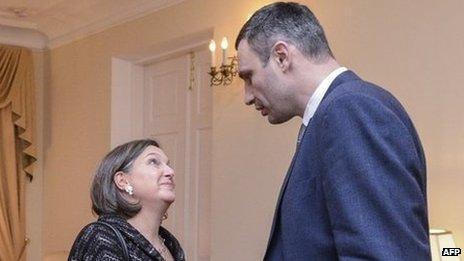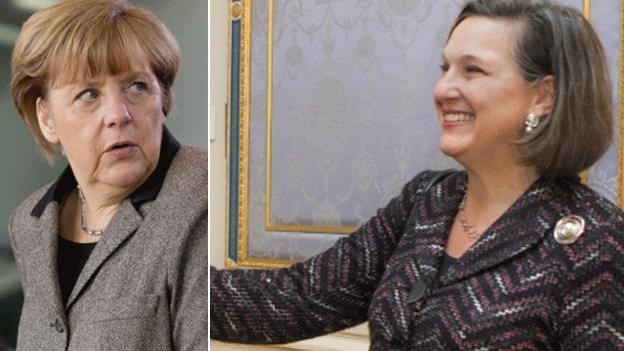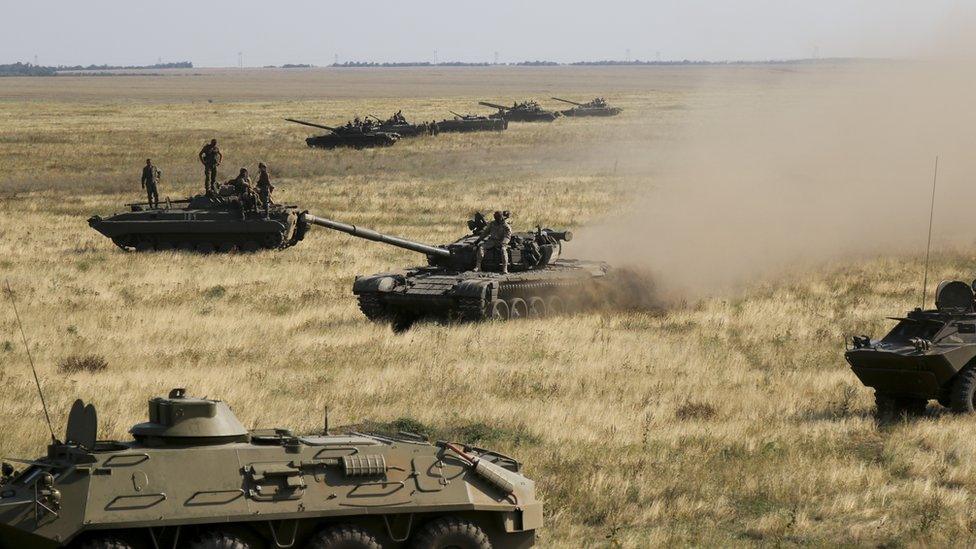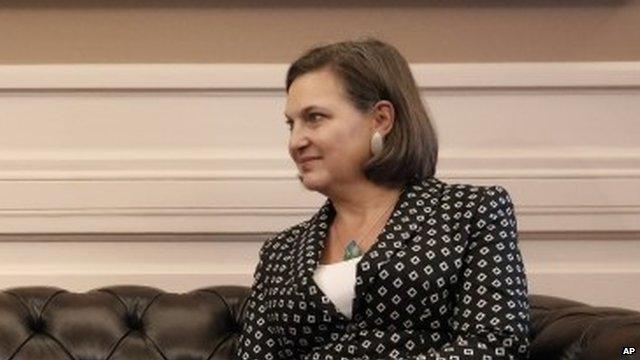Victoria Nuland gaffe shows diplomats can trash-talk too
- Published
Victoria Nuland: "Pretty impressive tradecraft"
This just in: diplomats can trash-talk too.
Social media networks are, well, atwitter about a phone conversation between US Assistant Secretary of State for European Affairs Victoria Nuland and US Ambassador to Ukraine Geoffrey Pyatt regarding developments and strategy in Ukraine that was intercepted and posted on YouTube.
An aide to Russia's deputy prime minister was allegedly the first to tweet a link about its "controversial" content, making its intelligence services the leading suspect.
Whoever did it, the culprit also captured and distributed a related, if more restrained, conversation between two European officials regarding the state of play in Ukraine. In it, they expressed concerns about American complaints that the European Union was not moving fast enough in response.
On the foreign policy playing field, diplomacy involves smiles and handshakes for cameras, carefully scripted talking points, and lots of food - consumed not thrown. But foreign policy is a contact sport, full of complex issues, high stakes, competing interests and palpable tensions.
The competitors do play for keeps. And in the locker room, while comments are properly punctuated, there can be the same tart exhortations, personal sensitivities and tactical differences familiar to any athlete in any sport.
Digital diplomacy

Nuland apparently said she thought it would not be a "good idea" for Ukrainian opposition figure Vitaly Klitschko to be part of a new government
Before joining the US foreign service, Ms Nuland spent eight months working on a Soviet fishing trawler where she perfected her ability to swear in multiple languages.
The YouTube post is yet another illustration of how difficult it is to protect sensitive information and confidential conversations in the digital world. Call it the two sides of digital diplomacy.
Diplomats are being urged to employ social media to reach beyond governments to engage real people.
This week, US Secretary of State John Kerry reactivated his personal Twitter account.
US Ambassador to Russia Michael McFaul, who employed social media as effectively as any US official to generate a two-way conversation with Russian civil society, announced he would leave his post some time after the Sochi Winter Olympics.
But the flip side is how technology enables a wide range of actors, including non-state actors, but in this case almost certainly a state, to process and deploy information clearly intended for real-time political effect.
'Rawpolitik'
Even though diplomats on both sides of the Atlantic have been swearing at and about each other for decades, this incident will only deepen European anger at the US that has developed with the Edward Snowden revelations over the past nine months.
It does, however, reinforce the point that countries, and not just the US and Britain, do in fact spy on each other.
But the real story about the "rawpolitik" is the purposes behind the posted audio.
It is a virtual manifestation of the intensifying rivalry between Russia and the West playing out in Ukraine.
For the past two months, Ukraine's President Viktor Yanukovych has been unable to find the right combination of sticks and carrots to end protests against his decision to turn away from an EU trade agreement in favour of a $15bn (£9.2bn) loan from Moscow.
Russian President Vladimir Putin is determined for reasons of history, geography and politics to prevent the EU and Nato from expanding to his door step.
Ms Nuland was making her fourth trip to Kiev since the crisis began over Ukraine's future political and economic orientations, clearly searching for ways to support the opposition.
While no-one is yet placing a colour on current events, Ms Nuland was bold enough during her intercepted call with Mr Pyatt to project the most competent and advantageous alignment of opposition leaders should a new government be formed.
Russia considers this meddling in its own backyard, adding more evidence of the return of an old rivalry, waged on a regional, if not global scale but nonetheless presenting sharply divergent views of Ukraine's future.
The contest represents what New America Foundation President Anne-Marie Slaughter calls the "chessboard world", characterised by moves and countermoves based on zero-sum calculations.
But the latest intelligence intrigue and propaganda comes with a modern twist, the employment of social media, and increasingly important diplomatic tool.
The Cold War has gone back to the future.
PJ Crowley is a former assistant secretary of state and now a professor of practice and fellow at the George Washington University's Institute of Public Diplomacy & Global Communication.
- Published7 February 2014

- Published12 August 2016

- Published7 February 2014
- Published6 February 2014
